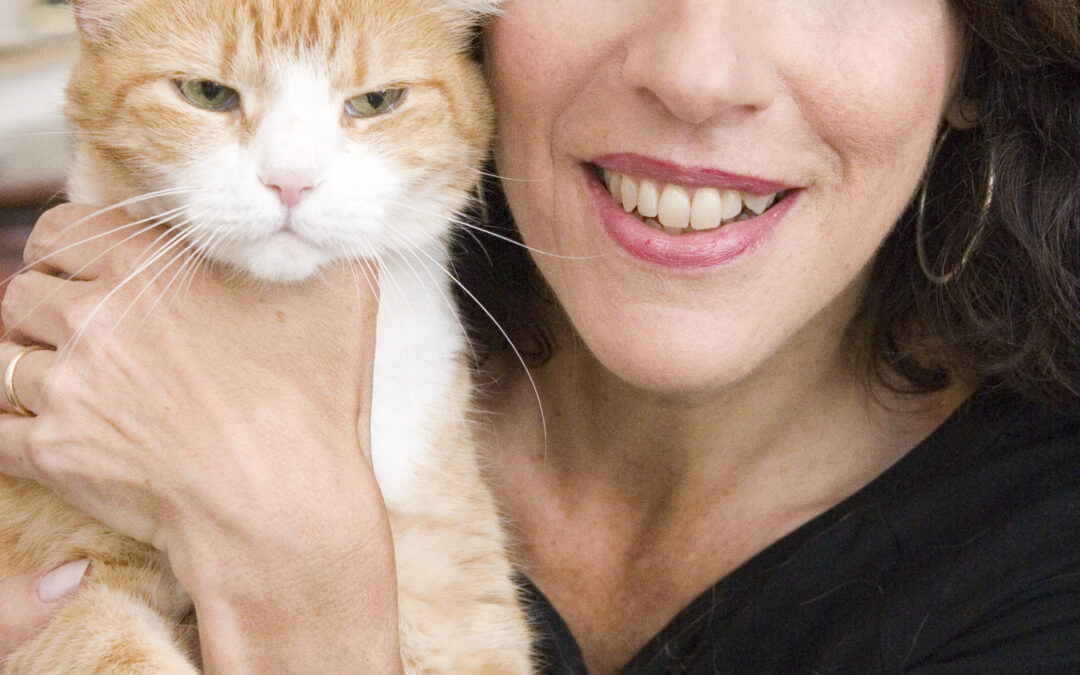
by Janice Meyerson | Jun 15, 2025 | Blog
Puccini’s opera Il Tabarro boasts a dreamy setting: a houseboat on the Seine, where the characters sing Puccini’s rich, soaring lines. Yeah, OK, they die or have terrible lives, but they get to sing fabulous music. Those characters, of course, are the soprano, tenor, and baritone. But I have sung the mezzo-soprano role of Frugola, which, for most mezzos, is no dream role: she’s a bag lady with ungrateful music to sing—high notes with no easy approach and no memorable aria. Frugola is a character role, so why would I want desperately to sing it, after having sung such roles as Amneris and Carmen? Because Frugola sings about her Orange Cat, how she loves that cat (il mio soriano dal pelo fulvo) more than she loves her husband, Talpa. I campaigned to be assigned that role when I was engaged at an opera theater in Germany, and had zero problem securing the job. But like many German productions, this one did not feature a traditional setting; instead of the gentle banks of the Seine, it was set in a courtroom in Third-Reich Germany, to be exact. And though the director instructed me to pull a real pig’s heart (even though Puccini specified “beef heart”) from my bag onstage (for the cat’s meal), he would not allow a real cat in the production. Despite the fact that the pig’s heart was locked up in the fridge between performances, the onstage smell was unbearable by closing night.
So you can imagine my delight when my manager procured a contract with the Arizona Opera for me to sing Frugola—and for my huge and beloved cat Big Red to be part of the production. The opera company would pay my fee and airfare, of course; the contract specified that Big Red would not receive a fee but that his airfare would be covered. I was listed on the contract as “Janice Meyerson, Mezzo-Soprano,” and Big Red was listed as “Actor.” This was quite a respectful title for Big Red, instead of the usual designation for a nonsinging role as “extra” or “supernumerary.” We agreed to the terms and submitted separate photos of myself and Big Red for the program. I spent the months before the engagement teaching Big Red to walk on a purple-rhinestone-studded leash. Well, “teaching” is the wrong term. More like hauling an uncompromising 24-pound bag o’ potatoes along a bumpy road.
I reviewed my score so that I could be note-perfect by the first rehearsal, eagerly anticipating a traditional Tabarro production, after the indignities in Germany. I confirmed my airline reservation and ensured that the cat carrier was regulation size for the aircraft. All was in order on departure day: I had packed everything I would need for three weeks in Arizona, including the rhinestone leash and some cat treats. Now to pack up Big Red and be off to the airport!
Big Red was nowhere to be found. At last, I found him cowering under the bed, unbudgeable. Finally, I coaxed him out—well, actually, I pushed him out with a long pole. I opened the carrier lid and tried to place him inside, but he simply would not fit. His well-larded haunches were hanging out over the sides of the container, making it impossible to fasten it shut. Try as I might, there was no way I could squeeze Big Red into that thing. I was going to be late for my flight.
Sadly, I left him at home. Il Tub-arro.
Upon my arrival in Tucson, the director asked where the cat was. “Oh, he got another engagement that paid more,” I answered cheerily. The director looked dubious. “OK,” I admitted. “He was too fat for the carrier. Yet another operatic career hampered by weight problems.”
We performed Il Tabarro to great, but catless, success, and Big Red never did get another gig.
by Janice Meyerson | Jun 15, 2025 | Blog
Like most singers, I’ve occasionally been called upon to sing for the dead. When I first moved to NYC as a young singer, I found a job as the contralto soloist at Saint Vincent Ferrer Church on the Upper East Side, known as “Our Lady of the Cadillacs.” Shortly after, I got a call to come in on a broiling summer day to sing a funeral. It was one of the hottest Julys on record, so we four soloists were grateful not to have to rehearse beforehand—because we already knew the piece: the Hallelujah chorus from Handel’s Messiah; in his will, the deceased had requested that it be sung as the recessional at his funeral. Sweltering in our burgundy polyester choir robes—which felt like permanently odoriferous saunas—our quartet solemnly entered the massive church, prepared for a large crowd of mourners; but no one was present except the priest, pallbearers (hired for the occasion, apparently), a scowling organist, and, of course, the deceased lying in his open-face coffin. The first corpse I had ever seen. The service consisted of the priest saying only a few words, asking, on behalf of the dead guy, for permission to enter the Lord’s heavenly realm.
The organist dutifully played the introduction to the Hallelujah chorus from his music score, but since it was a brand-new copy of Messiah, it would not remain open and flat, so in order to keep the pages from turning, he was constantly smacking it down on the music rack, while, of course, playing with both hands and feet, all the while uttering curses, as we started to sing.
By the time the pallbearers had exited the church, rolling out The Body (a coffin mounted on a Go-Kart!), we had gotten only as far as “For the Lord God Omnipotent…” every phrase punctuated by the organist’s “Shit! Shit! Shit!” as he swatted and slapped his score. Of course, we wondered: Did we have to finish? I mean, if a tree falls in the woods…. By the time we reached “The kingdom of this world,” in the now-deserted cavernous sanctuary, I noticed that the tenor was trying to control his laughter. How unseemly, I thought, how disrespectful. But then I saw that the soprano had totally stopped singing because she couldn’t stop giggling, while the bass was doubled-over. Now left singing a solo, I soon caught their contagion.… We never did reach the end of the piece. But we were paid handsomely. Hallelujah!
The deceased was a stranger, and there were no friends or family gathered, so I didn’t think much about our quartet’s appalling little descent into Handelian hysterics. But the next stranger’s service haunted me for weeks.
In the early 1990s, I received a phone call from a lawyer informing me that a person named Mark had left a sum of money in his will for me, as payment for me to sing at his memorial service in Boston. “Surely,” I said, “you must have me confused with someone else. I don’t know this Mark.” The caller persisted: “Mark specified in his will that he wanted you to sing Brahms’s Opus 91 at his service.” Hmm, I said, “That’s quite specific! In fact, I sang that piece on a concert in Boston a few months ago.” “Well,” the caller said, “he must have heard you then and decided that that’s what he wanted sung at his service. He had planned his own funeral and memorial service down to the minutest detail, as he had AIDS and knew that his death was imminent.”
So I agreed, and flew up to Boston on Mark’s dime. A total stranger.
My singing of Brahms Op. 91 took place at the beginning of the service. This time, clothed in a somber black dress and accompanied by a pianist and a violist, I had no trouble being solemn for the 12-minute duration of the two songs, their texts full of longing and resignation. After I sang, I settled in for the rest of the ceremony, which included numerous eulogies and more musical offerings.
I would have loved to have known Mark. Clearly, he cared for music in a serious way. A friend of his read Mark’s journal entries from the weeks before he died, covering everything from his abject fear of pain and death to his wondering whether he should buy toilet paper on sale at the supermarket but the offer was only for those 24-mega-roll packages, and he didn’t think he’d live long enough to use it all. I got to meet Mark’s lovely family. RIP, Mark. I wish I could have known you.

by Janice Meyerson | Mar 13, 2015 | Blog
A few years ago, I found myself in Colombia, where I was the mezzo-soprano soloist for Beethoven’s Ninth Symphony. Among the notes I took while there:
The orchestra management, mercifully, placed the soloists in the 5-star Hotel Intercontinental, whose atmosphere falls somewhere between a luxury hotel and a federal maximum-security prison. Armed guards everywhere. Doubtless, they are looking for rooms to rob, but nevertheless, they create some semblance of security. The reason we were placed at this hotel is that the entire orchestra was mass-mugged at the “other” hotel. Am trying to envision thieves making off with tympani, harps, and double basses…. (more…)


